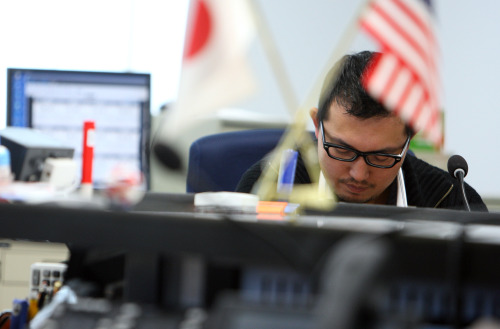The yen fell for a second day on speculation the Group of Seven nations will continue to sell the currency to curb its appreciation.
The yen slid against all of its 16 major counterparts, extending losses from March 18 after G7 nations followed Japan’s lead and sold the currency as it reached a postwar high, endangering the recovery from its biggest earthquake.
The euro rose versus the yen on prospects European Central Bank President Jean-Claude Trichet will Sunday reiterate the bank’s willingness to raise interest rates next month.
“Joint or solo intervention is still possible in the currency markets,” said Marito Ueda, senior managing director in Tokyo at FX Prime Corp., a foreign-exchange margin company. “This may help to halt risk aversion, which could be positive for equities and negative for the yen.”
 |
A currency trader works at a foreign exchange brokerage in Tokyo. (Bloomberg) |
Japan’s currency fell to 80.92 per dollar at 8:58 a.m. in Tokyo from 80.58 in New York on March 18. The euro climbed to 114.76 yen from 114.31 and was at $1.4170 from $1.4182. The financial markets in Japan are closed for a holiday.
The yen surged to a post-World-War II high of 76.25 versus the dollar in the week after a 9-magnitude earthquake and tsunami struck Japan on March 11. The appreciation came amid speculation investors will repatriate assets to fund the estimated 10 trillion yen ($124 billion) needed to finance reconstruction.
Japanese Finance Minister Yoshihiko Noda has said the coordinated central bank interventions are an attempt to limit the damage a strong currency will have on the nation’s economy.
Wells Fargo & Co. and Bank of Tokyo-Mitsubishi UFJ Ltd. say the gains will reverse as Bank of Japan Governor Masaaki Shirakawa injects cash into the financial system just as his peers prepare to tighten monetary policy.
“The yen will weaken over time,” said Nick Bennenbroek, head of currency strategy at Wells Fargo, the second most- accurate predictor of the yen against the euro in the six quarters through December, according to data compiled by Bloomberg. “The policy response from the authorities is going to be quite substantial. We have already seen action from Japan and other G7 countries. We would expect further intervention, at least from Japan.”
The euro rose for a second day versus the Swiss franc before the ECB’s Trichet, Council Member Yves Mersch and Executive Board member Gertrude Tumpel-Gugerell were to speak on Monday.
Trichet has said the ECB may raise its benchmark rate from a record low of 1 percent in April. “I have nothing to add, nothing to withdraw,” Trichet told reporters on March 18 in Frankfurt when asked if policy makers are still in a posture of strong vigilance, ECB code words for an imminent rate increase. “No new message at all,” he said.
(Bloomberg)








![[Herald Interview] How Gopizza got big in India](http://res.heraldm.com/phpwas/restmb_idxmake.php?idx=644&simg=/content/image/2024/11/20/20241120050057_0.jpg)